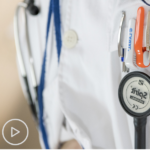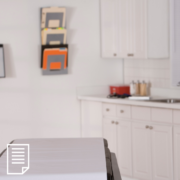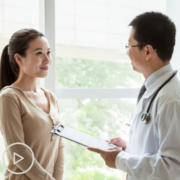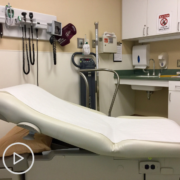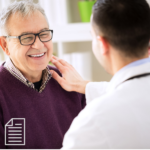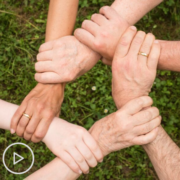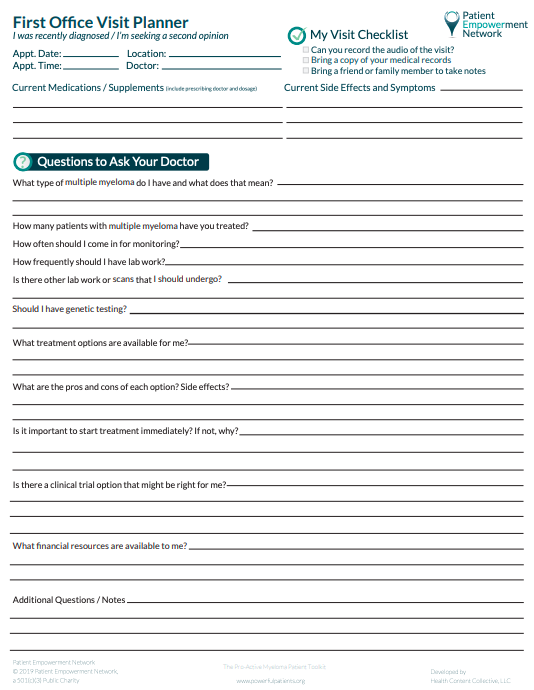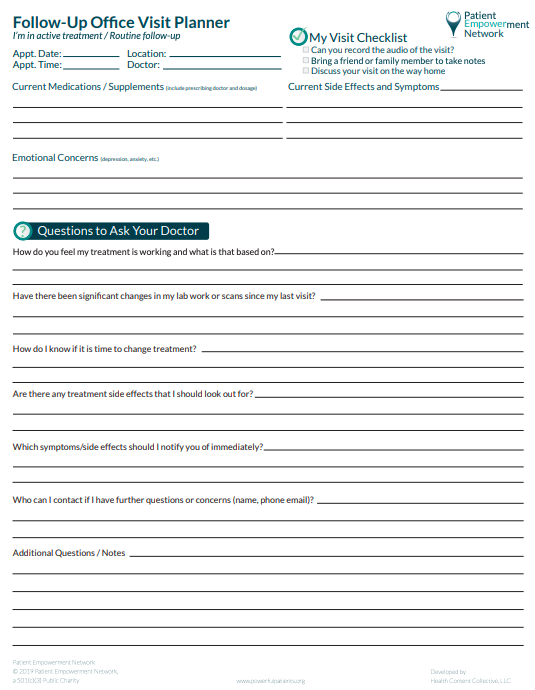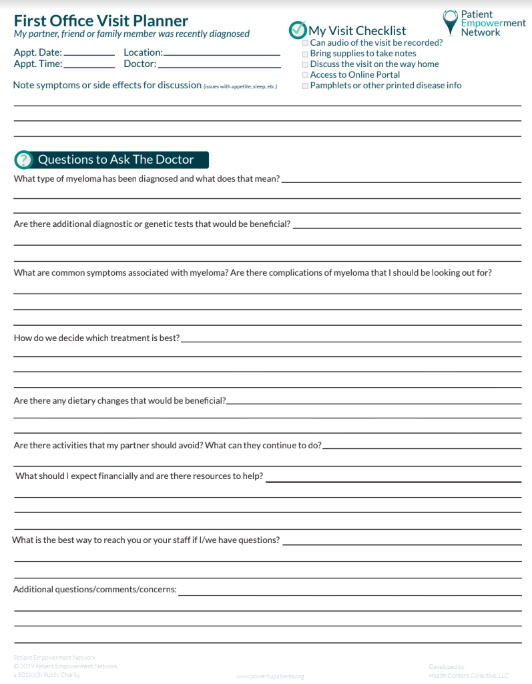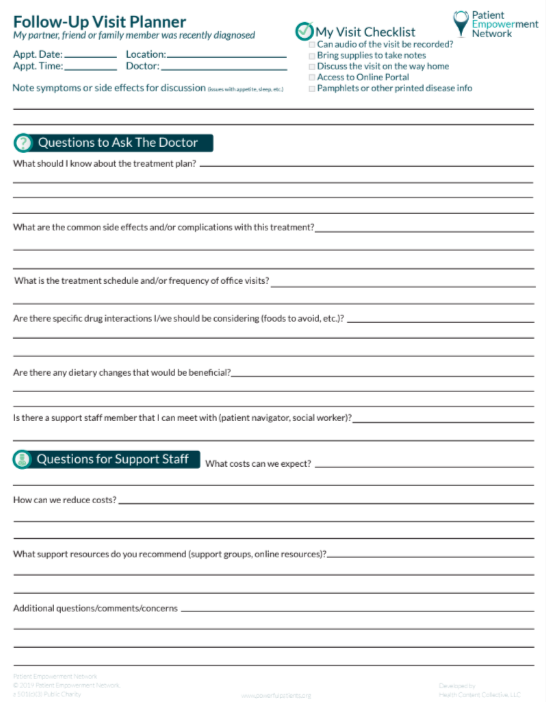Clinical Trial Mythbusters: How Does Medicare or Medicaid Impact My Ability to Participate in a Clinical Trial? from Patient Empowerment Network on Vimeo.
Downloadable Guide
Cancer patients are living longer as a result of clinical trials that test new treatments, therapies, procedures, or new ways of using known treatments.
Watch along as a panel of experts from the Diverse Cancer Communities Working Group (CWG) Sustainable Healthy Communities, LLC, Baptist Memorial Hospital–Memphis, and the American Cancer Society Cancer Action Network (ACS CAN) explore the questions:
- What do patients and their support networks need to know about clinical trials as an option for cancer treatment if they are insured through Medicare or Medicaid?
- What requirements differ from region to region and what is covered or not covered?
Transcript:
Laura Levaas:
Hello, and welcome to this Patient Empowerment Network Clinical Trial MythBusters program on a very, very important topic, what impact does Medicaid or Medicare have on a patient’s ability to participate in a clinical trial. My name is Laura Levaas, and I’m the lung cancer community manager for Patient Power. I’m also a Stage 4 lung cancer survivor. I’m two years out from diagnosis, and I’m also on Medicaid. So, this is a topic that’s really important to me on a personal level.
This program is produced by Patient Power. We want to thank the following companies who provided financial support to make this possible. While they don’t have editorial control, we appreciate the support of AbbVie Inc., Celgene Corporation, Daiichi Sankyo, and Novartis for their support.
Today we are joined by some really amazing guests, the first being Mark Fleury from the American Cancer Society Cancer Action Network out of Washington DC, followed by Jeanne Regnante, also out of Washington DC, and Jeanne is with the Diverse Cancer Communities Working Group, Sustainable Healthy Communities, and last but not least, nurse navigator Laura McHugh from the Baptist Cancer Center in Memphis, Tennessee. Welcome to all of our guests today. Thank you for joining us.
So, Mark Fleury, Mark is interesting because he has an understanding, a very deep understanding, about this issue from a regulatory and research perspective. He’s going to share with us what he’s learned about barriers in clinical trial participation and solutions to overcome some of those options.
Jeanne is going to share her viewpoint as part of the Diverse Cancer Communities Working Group. She helps share information about access to care treatment and inclusion in clinical trials for underserved populations.
And Laura McHugh who is joining us by phone (she is a friend of a friend of mine, and she’s really amazing) is a nurse navigator who has worked in the cancer space for 24 years. And she helps guide people in underserved communities every day as part of her working life. She works with Medicare and Medicaid patients on the daily. So, we’re looking forward to hearing from her.
So, back to our program, patients are living longer as a result of clinical trials that test new treatments, therapies, and procedures, or new ways of using known treatments for new ways. The myth here behind Clinical Trial MythBusters today is that being in a clinical trial isn’t covered by medical insurance particularly for Medicaid or Medicare patients. I know for me personally I’m interested in being in a clinical trial and I’m on Medicaid but I don’t even know what that means. So, I definitely need some guidance.
So, as we’re talking about this today, if you have any questions about if you’re a patient yourself or you’re a support person for a patient that has cancer or any kind of disease wanting to know about clinical trials on Medicare or Medicaid, we’re here to help you. Send your questions to questions@patientpower.info. So, viewers who are joining us today thank you again. If you’re on Medicare or Medicaid, what do you even do if you’re presented with the option to participate in a clinical trial to treat your condition? Let’s talk with Mark Fleury. Hi Mark.
Mark Fleury:
Hello Laura. Thanks for having me on.
Laura Levaas:
Yeah. We’re so, so grateful to have you on our program today because you have such a deep knowledge in this industry and on this topic. Can you tell us real briefly what exactly you do for the Cancer Action Network? And then I’d like to talk to you about barriers around Medicare and Medicaid.
Mark Fleury:
Sure. So, I work for the American Cancer Society Cancer Action Network. We’re the policy and advocacy arm of the American Cancer Society, and we focus on public policy, so that’s regulation, laws that impact cancer patients. And specifically, my work deals with policies around research and drug and device development, so how can we get those findings that happen in the laboratory into the clinic. And specifically, that goes through clinical trials. So, I’ve spent the last couple of years with a large partnership of other stakeholders taking a really deep dive into looking at clinical trials and all of the challenges patients have in getting themselves enrolled as a part of those trials.
Laura Levaas:
Good. We look forward to hearing more. Can you tell us a little bit about the current state of clinical trial participation in the US right now?
Mark Fleury:
Sure. So, there’s not real solid numbers, but we believe somewhere between 6 to 7 percent of US cancer patients participate in a clinical trial right now. So, that’s a fairly low lumber overall, and it’s also a fairly low proportion of the patients who would be interested. Research has found that between 50 and 70 percent of patients would say yes to participating in a clinical trial if they were asked. But unfortunately, many are not asked. And some of those who are asked are unable to enroll for a variety of external reasons. One of the things that we do know is that the people who do enroll in clinical trials tend to be less diverse and better off financially than the overall population with cancer.
Laura Levaas:
Okay. What are some of the barriers around Medicare and Medicaid patients who want to get involved in a clinical trial?
Mark Fleury:
Sure. So, obviously, first of all, there has to be a clinical trial for the patient based on your clinical characteristics. But assuming that that is the case, for a patient to enroll in a clinical trial, it’s critical that their insurance cover the routine care costs of that clinical trial. In other words, there are costs in a clinical trial that a patient would see regardless if they were in a clinical trial not. Say, for example, the first step of any treatment is a surgery and then the second step in normal care would be one drug but in a clinical trial it’s a different drug.
Well, regardless, you’re always gonna get the surgery. It’s important that insurance cover that routine part of the clinical trial. And unfortunately, historically, that’s not always been the case. Fortunately, in Medicare, they have covered that since 2000. That is not the case universally for Medicaid. And we can talk a little bit more about that later if you’d like.
Laura Levaas:
Okay. Perfect. I would definitely like to follow up on that topic seeing as I’m a Medicaid person myself. Can you touch briefly on what actually is different between the two programs in terms of clinical trial, the actual coverage? You mentioned routine care; is that for both programs?
Mark Fleury:
Well, so what’s important to note is that Medicare is a federally administered program. And so, there is one universal federal policy, and if you’re in Medicare, it doesn’t matter if you’re in Florida or if you’re in Idaho, the policies are identical. Medicaid is an insurance program that while partially funded by federal dollars, it’s administered by each state. And as such, each state has quite different policies. So, if you’ve see one Medicare policy, it’s uniform. If you’ve seen one Medicaid policy, it’s only relevant in the state in which you happen to be. So, it could vary significantly from state to state.
Laura Levaas:
Right. And so, depending on your state, you would need to follow up with your local maybe human services office to get specific questions answered.
Mark Fleury:
That’s correct. Yeah. There are some resources (and I think we can provide those at the end of the webinar) where generally speaking some states have passed laws or signed agreements in which their Medicaid programs have to cover those routine care costs in Medicaid. And we can certainly make available those states. But even within those states, it’s important to look closely at the policies. For example, in Medicare, Medicare also covers any adverse events. So say, for example, while you’re being treated, you had to be admitted to an ICU for heaven forbid a heart attack or something like that. Medicare pays for all of those unexpected expenses. And that coverage may vary state by state in Medicaid.
Laura Levaas:
Okay. Thank you, Mark. We’re looking forward to those resources. And for those of you watching, we will definitely be providing a downloadable guide with all sorts of resources to help you. Thanks Mark.
Mark Fleury:
You’re welcome.
Laura Levaas:
Hi Jeanne.
Jeanne Regnante:
Hey Laura.
Laura Levaas:
Okay. I can’t wait to talk to you about this. I have so many questions. I feel like we could talk for an hour. So, aside from the myth, I came into this thinking, “I’m on Medicaid; I probably can’t get into a clinical trial when and if I get to that point.” And then also, “If I am, it’s probably cost prohibitive because I’m on a fixed income.” So, is participating in a clinical trial expensive or cost prohibitive if you’re on Medicare or Medicaid like I thought? I mean, I know Mark touched on some of the issues, but what would you say? How would you answer that?
Jeanne Regnante:
For low-income patients, the cost of routine care and logistic support needed during a clinical trial is certainly a barrier to participation. And Mark pointed out some of these costs. But specifically in patients in rural communities, remote communities, aging population, children, patients with cognitive disabilities or physical disabilities. These are the same patients who have low access to care in general.
And covering the cost for routine care in a clinical trial and also the logistic support is a clear barrier to participation. So, there are clear barriers there, travel, housing, parking, paying for food, on having access to clinical trials not only for routine care costs like Mark alluded to but also logistical support being included in the clinical trials. So, all of those things are barriers.
Laura Levaas:
And would you say that seniors are also part of this underserved population?
Jeanne Regnante:
Absolutely, especially seniors that live alone, that are in remote rural areas in the United States. And remember, that’s 20 percent of the population, aging population, in those areas. So, clearly, we need to do better to engage those patients in care and also clinical trials.
Laura Levaas:
So, is it possible for us to draw any conclusions about how many people are on Medicare or Medicaid right now in the US? I did a little bit of internet sleuthing mainly through the Centers for Medicare and Medicaid, and it seems like there – the numbers that I came up with were pretty high, and it’s almost like 40 percent of the population is on Medicare or Medicaid. And so, has it –
Jeanne Regnante:
That’s absolutely true. Look at by the numbers, there is 329 million people living in the United States, and that’s according to the last census, which is a hot topic these days. There is 60 million people on Medicare, beneficiaries, and about 66 million people Medicaid. So, together, that represents about 40 percent of the population. And we have to remember kids. So, there are 7 million patients on CHIP, which is part of the Medicaid program. So, if you include percentage of people on Medicaid plus kids on CHIP, that’s 22 percent of the population.
Laura Levaas:
So, then circling it back around to clinical trial participation, how can we connect the dots here?
Jeanne Regnante:
So, I think one of the main issues is clinical trial sponsors and the clinical trial operations folks in the sites working together to do a better job of reaching out to patients, ensuring that everybody is asked to participate, and not just selecting the ones who people think can participate but asking everybody to participate and understanding the eligibility of all patients and working together to help to cover their costs to keep them in chart.
Laura Levaas:
Got it. Mark, I’m gonna pull you back into the conversation here for a minute. Can you touch briefly on what’s happening in the news right now around Medicare and Medicaid that could potentially impact clinical trials? Or maybe, Jeanne, you can speak better to that.
Jeanne Regnante:
I’ll let Mark take that one.
Mark Fleury:
Certainly, so, Medicaid traditionally has been a program that has served primarily children in many states, children and pregnant women. Starting close to 10 years ago with the passing of the Affordable Care Act, states had the ability to expand Medicaid eligibility beyond those kids and pregnant women. And now we see many states who have expanded the roles of Medicaid recipients to healthy adults who just happen to be lower income.
And so, what that really has changed is the number of people obtaining their insurance through Medicaid. Obviously, there has been a lot of – it’s a state-by-state decision whether or not Medicaid is expanded. The Affordable Care Act as a whole is hanging in the balance in a court case, and there’s obviously been a lot of discussion about whether it should continue or not. So, certainly, the number of people who are supported through Medicaid is a dynamic number, and that certainly is subject to changing policies that are still under active discussion.
I will say that Medicare, again, the coverage for routine care costs in clinical trials for Medicare, long-standing policy since 2000 that has been relatively stable. And I would expect that to continue unchanged.
Laura Levaas:
Thank you, Mark. And Jeanne, I’m gonna come back to you in a minute. For viewers that are watching, thank you for hanging in there with us. If you have any questions that you would like us to address in the program, we’ll get to that at the very end after we’ve talked with all of our esteemed panelists. Send your questions to questions@patientpower.info. So, now I would like to talk with Laura McHugh. Are you with us, Laura?
Laura McHugh:
I am. Thank you so much for having me.
Laura Levaas:
Hi. I am so excited to have you. I met Laura McHugh because she is a nurse navigator for a friend of mine who is ALK positive, which is the type of lung cancer that I have. And she works very closely with my friend and speaks so highly of Laura. So, I’m excited to have her on the program today. I wonder, Laura, if you could tell us why you think that clinical trials are important.
I wanted to share why they’re important to me personally. The medication that I’m on right now of course went through a clinical trial process, and it wasn’t even around before the year 2011. I was Stage 4 when I got discovered, which happens often with non-small cell lung cancer because many folks are asymptomatic. So, for me, what that means is if I didn’t have people going through the clinical trial process ahead of me, I probably wouldn’t be here today. So, on that level, is there anything that you can say why you think that clinical trials are important especially for people on Medicare or Medicaid?
Laura McHugh:
Absolutely. I believe that the clinical trials pave the way. All of the genetic testing that’s done now, all of the testing that’s been done all the way down to a molecular level. So, with these clinical trials and all of the things that have been tested, it’s opened up doors beyond what we ever thought we would have for lung cancer. There are so many opportunities and lines of therapy that you never had before.
And across the board, I think clinical trials and participation in clinical trials, all of the people that have done that, just opened the doors for all of the people in the future. We had a lady who was in her 90s, and she met all of the requirements, participated in a clinical trial. And all the way through, she said, “I want to stay on this. I want to do this. It may not help me, but it will help everybody after me.” And that’s just profound.
Laura Levaas:
Right. And so, Laura, tell the audience who you work with. I know that you specialize in thoracic cancers, and I know that clinical trials don’t always just focus on cancer. They deal with multitudes of diseases and conditions. But can you let us know who you work for because he’s famous in a way, right?
Laura McHugh:
Absolutely. I’m actually the physician nurse for Dr. Raymond Osarogiagbon. He is well known in the field of lung cancer. That’s our specialty. We have a multidisciplinary meeting every week and a conference. He sits on the board for NCCN and multiple, multiple other things as far as paving the way for lung cancer. I’ve been actually privileged to be his nurse since he came in 2005. We’ve built our practice together, and, oh, the changes are just – the changes that I’ve seen in the years that we’ve done this are amazing. And he is brilliant; he is. He’s known all over the world. And our focus is lung cancer.
Laura Levaas:
That’s great. Can you shed some light on the role of the patient navigator or the nurse navigator in what you do on a daily basis with your patients especially around clinical trials and folks who are on those government-supported insurances like me?
Laura McHugh:
Sure. So, we base all of our care – we – or I’m blessed to have a research department and two really dedicated research coordinators that I work with very closely. They’re not nurses like myself, but they do all of the coordinating for the care on the studies and all of the above from patients that are uninsured that are on Medicaid, Medicare, even private insurance. And what we do, we see primarily all of our new patients insurance allowing through our thoracic program.
So, I actually have a coordinator with me when I’m in clinic. And so, if we even think a patient is potentially eligible – not even just for a drug study. There are smoking cessation studies that we have, different protocols for that. So, it really starts at the beginning. There’s the surgical studies, different things like that. And every Wednesday is that clinic. And even during the week, if there’s anything going on, they come to our regular clinics as well and do follow up with the patient.
Laura Levaas:
So, I hear chatters here and there – when I bring up the subject of clinical trials, I hear things like, “Oh, trials are only for young people,” or, “Trials are only for old people,” or, “Trials are only for this type of person.” Can you speak to that a little bit?
Laura McHugh:
Wow. Yeah. Well, part of it is if you look at where we sit, there’s always – until now, in recent years, you heard about research but you didn’t really hear about research. So your older population, they were skeptical. It’s a different generation of, “Are you experimenting on me?” And part of your underserved communities, a lot of people didn’t know anything about it. They’re limited on getting to a physician in general much less being able to participate or being in a center that even focuses on clinical trials.
So, I think all of that in the past was very, very real. I believe now people are coming around and seeing, “Wow, anybody can do this.” I think people are still limited. Some people don’t have computer access. It’s hard in a day of electronics, we sit down and we can pull up all of this information, but not everyone can do that.
Laura Levaas:
Right. We do make a lot of assumptions when it comes to those type of factors. So, being that you’re a nurse navigator, I imagine that when you’re seeing a patient, you’re thinking, “Okay, is there a trial that this person might be good for?” I don’t want to say convince, but how do you help people learn about clinical trials and the importance of it because when you and I spoke yesterday, you said you want to make it clear to patients it’s always voluntary, “We’re not dragging anybody into a study. We want to make sure that you want to be there”?
Laura McHugh:
Absolutely. So, again, all of our patients are approved during a thoracic conference, and then all of the ones that we can bring to our clinic within our healthcare system we bring through that clinic, and if not, we bring them to our general oncology clinic. The physician will sit down with the patient. Of course, we’ve met with the coordinators, they’ve looked at everything. And they’ll come to us and say, yeah, they like this or this. The physician sits down and talks with them, and then I go in the room and talk with them as well. We tell them, “This is totally voluntary, something that’s open to you if you’re interested,” talk about it.
The coordinators go in and speak with them as well. We tell them to go home, “If you have any questions or concerns, call back.” And a lot of times they will. You have to be able to digest something. It’s a very overwhelming visit to walk in an oncologist office and be told all of this information and try to sort it all out on the spot. So, a lot of times they’ll go home, they’ll think about it, they’ll call back. Basically, communication, I just feel that’s the most important – it’s communication.
Laura Levaas:
Absolutely. So, to circle back a little bit, do you feel like it’s realistic for patients that are on Medicare and Medicaid to be in a clinical trial?
Laura McHugh:
Absolutely. I think it’s clinically appropriate for anyone that fits. If everything lines up the way it should and they’re able to participate, I think it would be wonderful if everyone would.
Laura Levaas:
This may seem like a silly question, but do folks on those programs get the same care as somebody that has a private insurance?
Laura McHugh:
Absolutely, absolutely from our standpoint. Of course, I’m answering from my institution and what I know that we do. And they do, absolutely. And sometimes there are challenges. I mean, we’ve had patients that were uninsured, underinsured. Again, Medicaid, you have to make sure – Medicare’s a little bit different again because all of the guidelines were set state to state. Medicaid’s different because each state has its own – and if you see someone in Mississippi, sometimes they can’t come across to Tennessee to go to the hospital or to do this. So, it’s a patient-by-patient basis, but overall, I think our patients are being treated, being offered clinical trials, and should participate if at all possible.
Laura Levaas:
Wonderful. And again, just to underline that clear and open communication is important.
Laura McHugh:
I think communication is No. 1 for everything. People are scared. They have questions. They don’t even know what to ask immediately. So, I think all of the support you can give – everybody has a knowledge base and everybody is empowered with that knowledge. Sometimes it’s all about just listening, communicating, and then answering any question they have no matter how simple it may be to us. To a patient, it’s a very profound thing. And it could be as simple as, “How am I going to get back and forth? Do you have a way to help me?”
Laura Levaas:
Thank you, Laura.
Laura Levaas:
Okay. I’m gonna circle back to the group and just ask some questions. I wanted to rewind with Mark and talk about Medicare Advantage. I am on Medicaid for about another year and I’m going to be rolled into Medicare, which under typical – I mean, I’m 44 years old, and so Medicare is typically for people that are 65 and older. And so, for me, it feels a little bit strange, and I’m like, “I just want to know how are they different.” And so, I have called my local CMS office, my local Social Security disability office. And I feel like I get different information. So, it’s sifting through everything. I just wanted to call out Medicare Advantage because you mentioned that. Can you expand on that and how it ties in with clinical trials?
Mark Fleury:
Sure, sure, happy to. So, traditional Medicare has multiple parts. You have Medicare Part A, which is the hospitalization, and Medicare Part B, which is the physician portion, and then a Medicare Part D, which is the drug portion. A few years back (understand the complexities of all the pieces and parts of Medicare) there was a decision to allow private insurance companies to administer all the programs together on an optional basis.
So, if you qualify for Medicare, you can use the traditional what’s called fee-for-service Medicare or you can go through a private insurance company. So, this might be an Anthem or a Blue Cross or another private insurance company like that who has been authorized to bundle all of your Medicare benefits together under one program. Now because it is a privately run version of Medicare, they’re required to offer the minimum benefits, but they do have some flexibilities in how they administer that.
So, a traditional fee-for-service Medicare, as long as a physician advertises that they accept Medicare patients, you can go anywhere you want to. If you live in Florida and you go on vacation into Los Angeles and become ill and you want to go visit a physician there, as long as they accept Medicare patients, that’s fine. Medicare Advantage on the other hand looks a lot more like private insurance in that they sometimes build closed networks, so, you can only go to certain systems or only go to certain doctors. So, that’s an important difference between the two.
And in terms of with clinical trials, how that’s affected, if you want to enroll in a clinical trial and you’re Medicaid Advantage, right now the current policy is for the portion of your care that is related to the clinical trial, you would revert back Medicare fee-for-service, traditional Medicare. That doesn’t mean that you are kicked off of Medicare Advantage, but anything related to that clinical trial would be handled from a payment and a billing standpoint through traditional Medicare.
So, if you’re on a cancer clinical trial, all those cancer clinical trial bills would go through traditional Medicare. But say, for example, you needed to get your flu shot or had a cold or something like that, that would still be handled under your traditional – or under your Medicare Advantage. You wouldn’t be kicked off of it. It’s just the treatment part of your clinical trial would go through traditional Medicare. So, a little confusing, but that’s where we are from a policy standpoint today.
Laura Levaas:
Okay. Jeanne, I wanted to ask you – and again, if you want to defer this to one of our other panelists, that’s A-okay. I’m thinking of folks who have some barriers around those additional costs in a clinical trial. Is it typical or acceptable for the, for example, pharmaceutical company or the sponsor of the clinical trial to pick up some of the costs that may not be covered under Medicare or Medicaid?
Jeanne Regnante:
The answer to that question is yes, it is appropriate for them to do so. And actually, there is an FDA guidance document (it’s Guidance for Industry) that actually reinforces their ability to do so because there has been some concern that covering costs like logistical costs or hotels or travel or giving people a gas card would create undue influence. So, I think the FDA put out a draft guidance that’s clearing that up and basically reinforcing the fact that pharmaceutical companies are able to do that.
I can tell you from our working group, we have 10 active major pharmaceutical company members in the Diverse Cancer Communities Working Group. And I asked them what they usually do in this space, and during the planning phase of the clinical trial, they go out to their sites to ask for a budget and ask them what they need in terms of routine care costs and also logistical costs. And the site sends that information in. And generally, the pharmaceutical companies cover those costs.
What I’ve found to be the case, which is interesting to me, is that the clinical trial operations team in the sites have a lot to do, they have a lot of work to do. And this was brought up to me by a couple of leaders in pharmaceutical companies, that what they’ve learned is that they also need to ask what capabilities do you need, do you need people support or FTE support to be able to adjudicate and track those costs at a site level and validate them and close them out and pay them. And a lot of times, the answer is yes and pharmaceutical companies are paying for those FTEs at the site. So, those costs are being covered when the site asks for support.
Laura Levaas:
Got it. So, since we’re talking about this topic anyway, that draft to FDA guidance publication, I’m gonna say it. It’s a really long title. It’s a mouthful. But I’m hoping you can break down a little bit of that. So, it’s called Enhancing the Diversity of Clinical Trial Populations, Eligibility Criteria, Enrollment Practices, and Trial Designs Guidance for Industry. What is the meaning –?
Jeanne Regnante:
So, I do want to paraphrase what the FDA says, but I’m gonna read the portions that I think are appropriate for this discussion. So, there’s a section in this guidance that was put out in June, and it’s a draft guidance, so, it’s open for public comment. And it focuses on study design and conduct considerations for improving enrollment in the industry. There’s a big section. I really would urge everybody on the call to read this section because I think it’s really great and progressive and quite empathetic of a major governmental agency to put out this guidance to industry.
It gives examples. It notes the burden for trial participants in remote and rural locations, for example, and also acknowledges the trial burden on the elderly, children, disabled, and cognitively impaired individuals who require caregiver assistance. So, what the FDA does in this guidance is they encourage industry to reduce No. 1 the number of study visits where possible and use electronic communications or mobile technology to monitor the patient for safety and efficacy because of the challenges of a number of folks in this patient population.
They also encourage industry to make sure that patients are aware of financial reimbursements, and that’s what Laura does. She manages their expectations in the recruiting stage and reinforces the fact – and the guidance also reinforces the fact that the FDA does not consider reimbursement of travel, lodging, parking, time, and other considerations to raise issues concerning undue influence. And they also reinforce that the amount of dollars that might be reimbursed should always be addressed with the local IRB. So, I think this is a very progressive guidance to give the industry so there are no questions on what they can and cannot do.
Laura Levaas:
Okay. Thank you very much. Laura McHugh, quick question, and Mark touched on this earlier in the program, what if something goes wrong in a clinical trial and a patient has to be hospitalized or treated for an unexpected reason? That’s covered, right?
Laura McHugh:
It has been for our patients. If it’s Medicare, what you always look at is standard of care. And the Medicaid patients that we’ve had, when they’ve been hospitalized, to my recollection, we’ve not had anyone that we’ve had difficulty substantiating why it should be covered. I mean, sometimes you have to go the extra step and go back and forth with the insurance companies or Medicaid. But we so far have been able to get it covered.
Laura Levaas:
I have a couple of questions that have come in from the audience, and feel free, Mark, Jeanne, or Laura. I’m assuming that a nurse navigator or a doctor is going to have the best information on where to find out about a clinical trial. But where are the best resources for someone to go? And again, I’m cancer focused because I have lung cancer and I work for Patient Power. And we support all types of folks with cancer. But there are folks that are in clinical trials that are not cancer related. Mark, what would be a source where somebody can find a clinical trial?
Mark Fleury:
Sure. So, in looking at the current cancer clinical trial landscape, we know that the overwhelming majority, probably 75 to 80 percent of patients, who end up on a clinical trial found that clinical trial because someone on their care team recommended it or someone from the clinical trial team approached them. So, it’s most common that someone from the medical system invites that patient. But we also know that a lot of patients get their cancer care at very small practices (they might be single-doc practices or things like that) where clinical research is not a normal part of what they do. And in that case, you would not necessarily hear about clinical trials from your nurse or from your physician.
In those cases, it’s up to an empowered patient to find the clinical trial on their own. And that’s obviously a little bit harder but certainly not impossible. And there are public-facing websites. Some of them are sponsored by the government, things like ClinicalTrials.gov where all clinical trials whether cancer or not are listed in the United States. And NCI has one, trials.cancer.gov, which is just NCI sponsored, which is the National Cancer Institute. So, it’s federally funded clinical trials.
But additionally, many patient organizations both have general educational materials about clinical trials – so, for example, the American Cancer Society at the website cancer.org has information about clinical trials. At the moment, we don’t have a matching window, if you will, but many patient-advocacy organizations also actively help patients one on one with matching. So, many of these are disease specific. So, there are lung cancer groups who you can call at the hotline, colorectal cancer, etc. Many patient-advocacy organizations will do the direct handholding and navigation if your own provider does not do that for you.
Jeanne Regnante:
I just want to add to that great list that Mark gave in terms of finding clinical trial sites. So, just a shout out to Stand Up To Cancer, they have a clinical trial matching site for any type of cancer. You can contact them, and they will actually match you to a clinical trial site in your area so you can give that information to your provider so they can call them to see if you qualify. Sometimes it’s difficult for anybody, myself included, to understand what clinical trial I might be eligible for just by looking at a site. So, it’s nice to have somebody do that for you.
Also, all the major pharmaceutical companies have if you happen to know about a given therapy or that you might be looking to be on because you heard about it it’s good to ask for help from somebody to find out what company makes it go to their website. And they all have clinical trial information on their sites as well.
Laura Levaas:
Thank you. And I’d like to share a little bit about my personal experience. When I was diagnosed, I was told about a Facebook group for my specific type of lung cancer mutation. And I learned about clinical trials from that group. And if I had never, like you said, Mark, been an empowered patient and been very curious in wanting the best care for myself, I probably would not have found out about those trials because some of them are just fly under the radar; they’re doing their work.
I think these are some great resources, and thank you for sharing those. One more question that I would like to ask the group before we – we have a couple of questions that came in from the audience, which is awesome. What is one solution (Mark, we’ll start with you) that you would like to put forth to address the issue of better clinical trial participation for Medicare and Medicaid patients which really, I mean, goes out to the larger group, I mean, really for anyone?
Mark Fleury:
Yeah. Well, I think specifically within the population of Medicare and Medicaid, as I mentioned at the outset, Medicare has a uniform national policy. So, someone like Laura, if she became a clinical trial professional in a different state, the Medicare policy would be the same it doesn’t matter what state you’re in. Whereas Medicaid, it varies so much, and that can be quite a bit of hurdle.
As I mentioned, I work in the policy and advocacy portion of ACS, and so, we focus on legislation. And so, one of the public policies that we have been advocating for (and there’s actually a piece of legislation before Congress right now), it would harmonize all 50 states plus DC Medicaid policies such that standard of routine care costs in cancer clinical trials would be covered in all 50 states in the same way and there wouldn’t be this ambiguity or uncertainty from state to state in terms of how it’s covered. So, that would be my one wish within this question if I could wave my magic wand.
Laura Levaas:
Yeah. That would very much clarify everything. Ms. McHugh, do you have a solution? What would you like to see happen to get more folks participating in clinical trials specifically those on the Medicares and Medicaids?
Laura McHugh:
Again, from my nursing background, a lot of it’s communication. And I think it’s sitting down with patients and explaining what some of the benefits are, what the risks are but what the benefits are because truly the benefits outweigh the risks. People worry about money and they worry about all of these things. Well, if it’s Medicare, it’s standard of care. Anything above and beyond, if there’s a problem, then you appeal back to the drug company, the provider.
Opening doors, communicating with patients, telling them, “You have a more active role in your own healthcare when you’re on a clinical trial. You’re empowered. You’re educated. You’re the first to benefit from this drug. You have your health professionals close. You’ve got a research coordinator, your nurse, your doctor, access to new drugs that may not be available.” I just feel like communication and – we’re totally sitting down with someone and explaining and taking some of the fear away from what people think about being on a clinical trial.
Laura Levaas:
I have a friend in the lung cancer community that was in a clinical trial. I don’t remember the specific drug, but she is still on it after it came out of trials. And she’s been on it for years, which is amazingly successful. And if not for that trial, she wouldn’t be where she is. And so, that’s just amazing. Okay. And then, Jeanne?
Jeanne Regnante:
You know what, first of all, I agree with what Mark said and what Laura said. First of all, it needs to be legislated. And No. 2, there needs to be better communication amongst trusted providers, trusted community leaders, primary care physicians to talk to patients to have them understand that a lot of these trials now include placebo versus standard of care and also help them to manage their expectations in terms of what will be covered in terms of their cost. And the folks that need to do that are the closest to the healthcare systems and patient navigators and care coordinators who can talk to an individual specific situation.
I think in addition to all those things, I think that generally industry needs to do a better job of placing trials where the patients are. Although that seems quite trite, patients that are in underserved communities or in rural communities, they don’t often have access to these cancer centers which are big academic centers that do a lot of these trials with big innovations.
And I think that we need to get much more creative to make sure that either the reach out from those academic centers go out to community centers or we do a better job placing clinical trials in community research centers to ensure better accessibility because really, logistical support, even if you cover it, even if the industry covers it or cancer care covers it or the American Cancer Society cover it or a laser X organization covers it, it’s still a challenge and a barrier.
So, I think we need to do a better job overall. The infrastructure needs to place trails where the patients are because cancers are not homogeneous across the United States. They appear in different places with higher risk and higher prevalence. And we need to use that data to place trials where the patients are.
Laura Levaas:
I agree. I’m actually located in Denver, Colorado, and I was doing some research for a blog post recently. And I went to American Cancer Society, Mark, just to look for what are the most recent statistics by state in terms of cancer. And obviously, it’s not lung cancer specific. But I was shocked to find out that Colorado has one of the highest percentages in the country of cancer occurrence. And I was surprised. So, Laura, would it be appropriate – this article that you sent me this morning from ASCO, would this be appropriate to include in our downloadable guide for our guests after the program? This was about the Affordable Care Act because we were talking about how people can get involved if they’re interested. What do you think, should we include this, Jeanne?
Jeanne Regnante:
Oh, I heard you say Laura.
Laura Levaas:
Yeah. Sorry.
Jeanne Regnante:
I think it’s a really well thought out piece to help folks understand how they can get involved with their legislators and understand that this act and this piece of legislation to advocate [inaudible] [00:50:28] specifically for patients that are on Medicaid in the United States so they can get the same benefit of routine care that Medicare patients get.
Laura Levaas:
I do have a question from Steve, one of our audience members, and he says, “Can Medigap Plan F help with paying for clinical trials? If the clinical trial accepts Medicare, would my out-of-pocket expenses be covered? I’m worried that any extra testing would be my responsibility.”
Mark Fleury:
Yeah. I’m happy to jump in with a quick answer on that.
Laura Levaas:
Okay. Thanks Mark.
Mark Fleury:
So, I mentioned a little bit before about what’s required to be covered. When you think about costs involved in a clinical trial, I’ll put them in three buckets. There is the normal routine medical care that you would get. So, for example, if you would normally get surgery and then followed up by some sort of chemotherapy, everybody’s gonna get the surgery regardless. And then say, for example, ordinarily routine care would be you would get a scan every six months after surgery, but the clinical trial because they want to collect more data wants to have a scan every three months instead of every six months. And the clinical trial is testing a new drug after surgery.
So, Medicare would pay for the routine costs, which would be the surgery and then a scan every six months. The clinical trial sponsor would pay for the drug, which is what you’re testing in the clinical trial. So, the patient doesn’t have any responsibilities for that. And since there’s basically twice the frequency of scans, the sponsor would pay for every other scan.
Now what’s important is that while Medicare covers the routine care costs, it covers them the same way it would cover any other cost. So, if you have a co-pay for a doctor’s visit that is routine, just because you’re on a clinical trial, that co-pay doesn’t disappear. So, if you have a Medigap plan that covers those co-pays, it should cover them the same way as if you were not on a clinical trial because the only responsibility for the patient is the co-pays of the routine care costs, and Medicare will pick those up.
So, anything that’s not normal from a medical standpoint will be paid for by the sponsor. Now as Jeanne aptly pointed out, if you’re coming in twice as often for tests, even if the test itself is paid for, you might be paying for the parking garage twice as often or gas to travel twice as often. And those are nonmedical costs that can add up, but they’re not really involved with insurance, but you can sometimes get money from the sponsor or other third-party support organizations like ACS.
Laura Levaas:
We have one more. Annie B, “I’m on Medicare. Where do I find a clinical trial in my town?”
Mark Fleury:
Typically, most of the ways that you find clinical trials, again, you can work directly with where you’re seeking care. So, if you have an oncologist, you can ask them about clinical trials. And if they conduct them, they will screen you for the trials that they have open at their site. If they don’t conduct clinical research, then you would either go to one of these public websites like a ClinicalTrials.gov, you could call an advocacy organization. There are several in the lung cancer space, and we can provide a number of different links to different matching engines or third-party organizations that could help match you. But clinical trials typically are not restricted based on insurance types. So, you would use the same search engines as anyone else would.
Laura Levaas:
Okay. All right. Well, I want to say thank you so much to our esteemed guests for joining us today. We learned so much today about clinical trials, Medicare and Medicaid, the different options. So many takeaways here. We will have a downloadable guide available as well as a replay of the program in case you’d like to dig in a little bit deeper.
Really, I think my takeaway from the whole program is that there are options out there. Clinical trials can be a great solution for your medical care of your disease. I personally am all for it. I know it’s a very personal decision, whether you want to participate or not. But I decided early on that I would definitely enter a clinical trial because I’m willing to sacrifice myself for future generations because there are people that came before me that did the same and I would not be here today if not for that. So, thank you again for joining us Mark, Jeanne, Laura. We very much appreciate you.
We thank AbbVie, Celgene Corporation, Daiichi Sankyo, and Novartis for their support.
